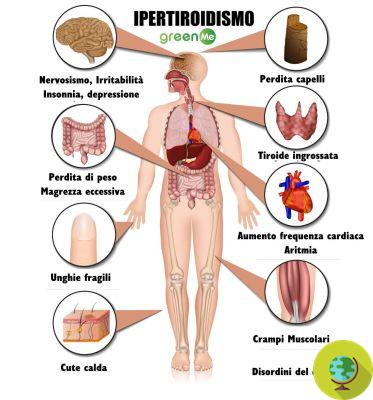What is it and what are the causes of hyperthyroidism? How does it manifest itself, what symptoms to watch out for and how to intervene?
Don't store avocado like this: it's dangerousWhat is it and what are the causes of hyperthyroidism? How does it manifest itself, what symptoms to watch out for and how to intervene?
THEhyperthyroidism it is a pathology caused by an excessive activity of the thyroid. That is, the thyroid gland releases large quantities of thyroid hormones, functioning more than it should. But what are the causes of hyperthyroidism? How does it manifest itself and what are the best treatments?
Metabolism, nervous system e heart are the first three things that suffer from a condition of hyperthyroidism. Thyroid hormones T3 e T4, in fact, they regulate the speed with which the body's chemical processes take place, the metabolism in fact, influencing many of the vital functions, just like heart and respiratory rate, fertility, digestion and growth. (Also Read: Thyroid Problems: 10 Most Common Symptoms)
Mostly women between 20 and 40 suffer from it, but if it can arise at any age.
Symptoms of hyperthyroidism

Hyperthyroidism is also linked to disorders such as:
- excessive sweating,
- tremors,
- heat intolerance,
- Brittle nails and hair
- Weight loss, oversized thinness, heightened sense of hunger, but also diarrhea
Furthermore, precisely because thyroid hormones are thermogenic, the skin of a person suffering from hyperthyroidism is hot from excessive blood flow and peripheral vasodilation.
Hyperthyroidism, like hypothyroidism, is often associated with:
- goiter, i.e. an increase in the volume and weight of the thyroid gland,
- while you can also suffer from excessive or even brittle hair alopecia.
- An excess of thyroid hormones, then, increases the "protein catabolism", which can cause muscle weakness, and can affect the activity of the central nervous system, causing psychological disorders such as nervousness, agitation and insomnia or a true psychosis.
Nor should the repercussions of hyperthyroidism on the heart be underestimated: the heart ratein fact, it increases and hypertension can occur, often associated with hypertrophy of the left ventricle. This is why hyperthyroidism should definitely not be overlooked in older people.
The causes of hyperthyroidism
In most cases, hyperthyroidism is due to the so-called son of Graves –Basedow, a autoimmune disease which alters the control mechanism of thyroid hormone production.
But other causes are:
- an inflammation of the thyroid gland (thyroiditis),
- an abuse of thyroid preparations for slimming purposes;
- the presence of nodules (toxic goiter);
- pituitary adenoma;
- excessive intake of iodine, but mostly in predisposed subjects (in any case, experts advise to be careful not to abuse iodized salt and supplements).
A transient form of hyperthyroidism can also occur during pregnancy or soon after delivery, which will resolve spontaneously within a few weeks.
Based on the cause of origin, the therapy to be followed is decided. Typically, the pharmacological therapy it is based on two main categories of drugs: i thyrostatics, which inhibit the production of thyroid hormones, and beta blockers, which keep all peripheral manifestations of hyperthyroidism under control. Finally, in addition to the radiometabolic therapy with radioactive iodine, there are also the thyroidectomy, surgery in which the thyroid gland is completely eliminated, and the subtotal thyroidectomy, which removes only a part of it.
On hyperthyroidism and thyroid problems you may also be interested in:


























